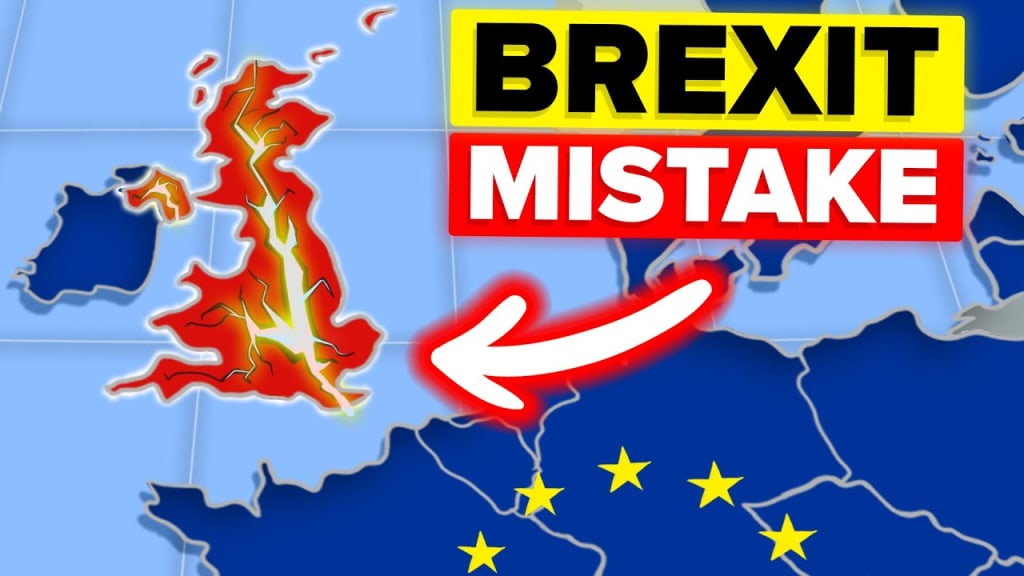Why is the United Kingdom Doomed Following Brexit?
Brexit's consequences will cast a dark cloud over the United Kingdom and may be the last piece of the puzzle for the faltering country. Might it, in fact, spell the collapse of one of the world's oldest democracies? Read this shocking narrative to see how Brexit might devastate the United Kingdom. ❕🤯🤯❕

Brexit's consequences will cast a dark cloud over the United Kingdom and may be the last piece of the puzzle for the faltering country. Might it, in fact, spell the collapse of one of the world's oldest democracies? Read this shocking narrative to see how Brexit might devastate the United Kingdom. ❕🤯🤯❕
23rd of June 2016. Brexit has won the vote in the referendum on joining the European Union. Supporters of Brexit are overjoyed that the United Kingdom will leave the EU. However, you should be careful what you wish for because Brexit could have devastating long-term effects on the stability of the United Kingdom. In fact, is it possible that Brexit will bring about the demise of the UK, one of the oldest democracies in the world? There was plenty of time to discuss the effects of Brexit, and many people attempted to stop it in its tracks, including a coup attempt against the Prime Minister that almost resulted in an unlikely coalition with a divisive Labour Leader. But in the end, the UK left the EU on January 31, 2020, just two months before a pandemic, lockdowns, and everything else associated with 2020 completely turned the world upside down.
Therefore, it can be challenging to distinguish the effects of Brexit from everything else. But there are unquestionably negative effects. Brexit's primary objective was to restore the can-do, independent British spirit that saw the nation through the Wars; while some might argue that it succeeded, it also isolated Britain from a much wider support system. The EU is made up of 27 nations, and all of them have an agreement that permits free travel and advantageous trade terms among them. The UK is currently outside the EU. It might have seemed like a good idea at first, but it wouldn't take long for the UK to begin experiencing the consequences. And now that it has been almost three years, the effects have only worsened. One factor is the sharp rise in labor shortages in the UK. The reason for this is that many foreign workers fill jobs throughout the EU, but now that the EU has left the EU, they must obtain permission to work in the UK.
The UK is a distant second choice for those looking to work in Europe due to the time-consuming process of obtaining a work visa and the question of whether it makes more sense to apply to work in one country or a network of 27 countries. Horrors! This has resulted in job openings at the neighborhood pub, but it has also created numerous positions in vital industries like healthcare because the foreign workers simply aren't coming. And that is important in yet another crucial area. Although it is easy to make jokes about British cuisine, such as "blood pudding" and "mushy peas," Britain does have a thriving agricultural industry that can feed the nation all year. However, no industry has been affected by the Brexit-related labor shortage more severely than agriculture.
Most of the time, farmers simply don't have enough workers to finish harvesting all of their crops, which results in wasted harvests, failed farms, and bare supermarket shelves. Industrial farms frequently employ up to 3,000 workers during harvest, many of whom are from Eastern European nations, and the lack of staff is threatening their ability to feed Britain. Although Britain has imported most of its food over the years, it may have been able to meet some of its domestic food needs. In fact, the shocking revelation that the UK imports two-thirds of its cheese from abroad shocked Liz Truss' party conference during her very brief tenure as prime minister. This was obviously a disgrace because you can't have a stuffy politician conference without some cheese.
However, Brexit has made it much harder to simply import food. Under EU law, tariffs and inspections were generally minimal, but now every import and export agreement must be renegotiated. Additionally, the government wants to enact new import restrictions, which could make addressing the farming shortages even more difficult. But Brexit has complicated more than just this. Most people living outside of the EU find traveling within it strange. It took a lot of trust and cooperation for 27 independent nations to agree to let their citizens cross borders without showing their passports. The UK may be an island, but residents still frequently crossed over using a tunnel under the English Channel that connected them to France via a high-speed train line.
However, times are changing, and traveling abroad from the United States frequently means waiting in long lines for searches and questions, followed by even longer lines when you return. Although there is still no restriction on travel between the UK and the EU because they are still allies and NATO members, it is now necessary for passengers taking a train to cross the English Channel to have their passports with them and be ready for additional security checks. If a crucial document is misplaced, it could cause a minor issue that could still ruin a vacation. And if Brexit has brought about anything, it's lines. Brexit seems to have increased paperwork, bureaucracy, and delays almost everywhere. This is especially true at the borders, where it was particularly evident in July 2022 when people trying to enter the country through the Port of Dover encountered long wait times.
Conservative politicians initially claimed there wouldn't be any significant delays, but the simple requirement of passport checks quickly snowballed into enormous six-hour waits. And it wasn't just at British ports; all those quick-check lanes that had previously allowed British visitors to breeze through European passport checks were suddenly gone, and ports throughout the European Union found themselves dealing with significant delays as they had to make sure that British visitors were in the country legally and had plans to return. I guess expat Britons should practice their stiff upper lip, but pretty much everyone will be affected by Brexit in some way. Imports and exports in other industries have also suffered greatly.
Exports to Europe were predicted to have decreased by 14 percent in the first year following Brexit. This was partially caused by COVID, but the effects have persisted, in large part because of the increased costs, security measures, and paperwork that everyone must deal with. That includes a huge number of small businesses, for whom shipping goods abroad is now more expensive than ever. Many long-standing small businesses may decide to close rather than try to compete in this brave new market, and they will likely be replaced by either locally focused businesses or—more likely—global chains that are adept at navigating the red tape. And the economy has suffered long-term consequences as a result. One of the main selling points of Brexit was the UK's ability to leave the EU's expensive fees and sharing arrangements, which were intended to improve the welfare of poorer countries with the assistance of wealthier ones like Britain and France.
And the UK is no longer required to pay those fees, although this may not be a good thing. The EU's GDP has increased by more than 8% since Brexit, whereas the UK's growth has been less than 4%. That's far below expectations, and while a large part of it can be attributed to COVID, the nation's difficulty in attracting workers and exporting its goods isn't helping either. Britain is therefore making less money, though it may also be spending more domestically. The topic of inflation is currently a hot one. Everything seems to be getting more expensive these days, from airfare to everyday items at the grocery store. Some criticize the large sums of money used to support Ukraine's defense against the Russian invasion.
Some accuse corporations of being greedy. The answer is complex, but one thing is certain: inflation is not the same across the board, and Britain is faring worse than the average EU member. Even while it was a member of the EU, it maintained its own currency, the British pound, and the pound is currently declining significantly. The United Kingdom isn't benefiting from the Eurozone's apparent improvement in inflation, and the country's ongoing supply chain problems and labor issues hardly give investors reason to be more optimistic about the future of the economy. But Brexit isn't just bad for Britain's economy; it's also bad for its culture. The United Kingdom is a significant tourist destination, ranking fifth in terms of tourism revenue and tenth in terms of visitor arrivals, thanks to a variety of factors.
If Americans don't want to learn another language, they can visit one of the closest foreign countries that speak English. It also has an abundance of tourist attractions, from classics like Big Ben and Windsor Castle, where the Royal family resides, to more contemporary ones like the Alton Towers theme park. Even fabled historical locations like Stonehenge were there. But will the tourists continue to arrive? American tourists are likely to continue to arrive because their situation hasn't really changed, although the rising cost of flights may persuade some to choose Canada as their preferred international destination in place of the United States. But when it comes to visitors from the EU, they might be tempted to choose the Colosseum in Rome or the Eiffel Tower instead of traveling to Britain because of the requirements.
No one knows if Britain's overall economy will ever recover, even though tourism revenue is currently completely in flux due to the pandemic and is only just beginning to recover. But traveling isn't all fun and games. For some, it's their source of income. A long-standing custom in the performing arts is the traveling showman. It has its roots in the Middle Ages, when bards would roam from town to town performing their songs in hopes of receiving tips from the populace—and avoiding upsetting the local authorities. Today, vans of traveling musicians looking for their next gig have taken the place of country roads, and for British musicians, finding those gigs has become much more difficult. Nowadays, traveling on tour requires navigating a maze of paperwork that never seems to end.
In addition to needing a visa to perform in the EU, they may also have to comply with various rules at each border, including searches that run the risk of destroying their pricey musical instruments. And it has put some significant obstacles in the way of even the biggest British musicians. Some of the biggest music festivals in the world used to be held in continental Europe. A large number of British musicians have had to curtail their plans due to the associated travel expenses for festivals that they once considered mainstays of their tours. The outcome: There has been a nearly 50% decrease in British performers at EU festivals. This has had an impact on the festivals' quality as well as the artists' income and opportunity to raise their profiles. The artists have to deal with extra red tape at the borders in addition to having to pay a different tax rate in each country they travel to.
It would almost be sufficient for a struggling musician to follow his father's advice, put down the guitar, and find a respectable position at the fish factory. When the Brexit campaign first began, one group was more vocal than the others: the fishermen. They had grown weary of EU fishing regulations that granted other nations access to the productive British fishing grounds and mandated compliance by seafarers with quotas and sustainability requirements. They anticipated Britain regaining control of the seas, revitalizing their sector, and, of course, lowering the price of fish and chips, a traditional British dish, to record lows. Unfortunately, Brexit may have increased the cost of those individuals' preferred fried food. The fishing waters surrounding the UK were divided in the final Brexit agreement, which fell short of what British fishermen wanted.
Fish and seafood exports to the EU have significantly decreased as a result of the split, which has had a much more significant impact. Due to the high cost of shipping, fishing companies frequently experience a loss on every shipment made abroad. Since most of the catch is for domestic use, fewer fish are required. Due to this, fishing businesses have had to reduce their operations, and many fishermen are searching for more lucrative and stable employment. Hmm, perhaps it's time to return to school. The UK's educational sector, particularly its universities, has suffered greatly as a result of Brexit. The number of international students has shrunk, and fewer British students are now permitted to pursue studies abroad. The border issue is to blame for everything, but there might be a hidden, more serious issue.
The foundation of the academic world is university-to-university research collaborations, but because international travel can be challenging, many experts are reluctant to collaborate with British universities on long-term projects. This could lead to the cancellation or delay of research projects, a brain drain away from British universities, and a reduction in the growth opportunities available to incoming students. However, given that the UK isn't as united as it once was, a much bigger issue could be developing. The United Kingdom is made up of four distinct regions: England, in the center of the large island; Scotland, to the north; Wales, on the west coast; and Northern Ireland, on top of Britain's longtime rival Ireland. Each of the four regions has a unique culture, dialect, tradition, and sense of local pride. There are independence movements in each of the four countries.
Scottish independence narrowly failed a few years before Brexit, and Welsh independence movements are quieter but still significant. As the Troubles fade into history, more people in Northern Ireland are considering the possibility of a united Ireland, despite the fact that it is still largely Protestant and not exactly in step with the rest of Ireland. After the last Scottish referendum, the UK still hasn't agreed to take into account any other independence movements. But that might be changing as a result of Brexit. Scotland's voters narrowly chose to maintain the status quo in 2014 by voting against independence. Young voters swung in favor of independence in the hopes that Scotland would be a more progressive nation in contrast to the UK's protracted history of Tory Prime Ministers.
Meanwhile, older voters tipped the scales in favor of staying. Perhaps it was due to their fidelity to the monarch, perhaps it was because they preferred conservative governments, or perhaps it was simply because they preferred the way things were and didn't want them to change. The issue is that things no longer operate in this manner. All membership benefits were lost when the United Kingdom left the European Union, whether or not the Scots were in favor of them. Scotland had a 62-38 majority in favor of staying in the EU, but they were ultimately defeated. Many people are now wondering if Scotland could reapply for membership in the EU after becoming independent. While it wouldn't be guaranteed, there is a good chance that the EU's top leaders would be sympathetic to them and quickly consider them for membership. According to recent polls, support for a second Scottish independence vote has surged and is now likely to pass.






Comments
There are no comments for this story
Be the first to respond and start the conversation.